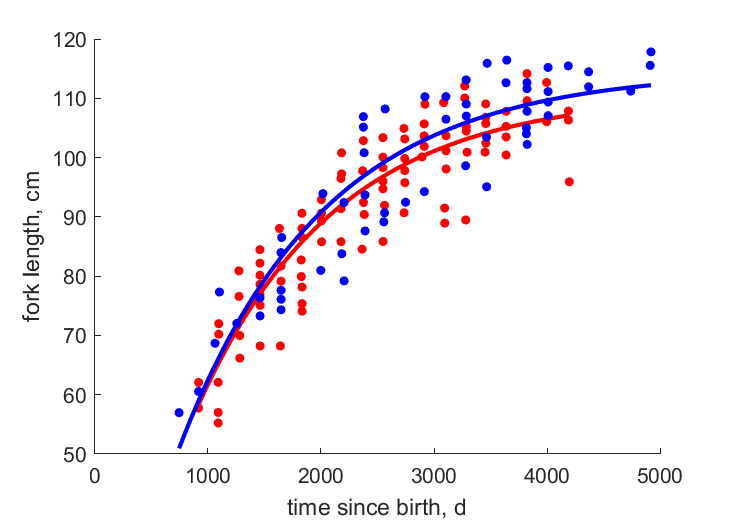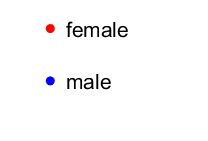Predictions & Data for this entry
| Model: std | climate: MA, MC, MC | migrate: Mo | phylum: |
| COMPLETE = 2.5 | ecozone: MC | food: bpPz, bpCi | class: |
| MRE = 0.042 | habitat: 0iMp | gender: D | order: |
| SMSE = 0.003 | embryo: Mp | reprod: O | family: |
Zero-variate data
| Data | Observed | Predicted | (RE) | Unit | Description | Reference |
|---|---|---|---|---|---|---|
| tp | 1679 | 1644 | (0.02062) | d | time since birth at puberty | FranGrig2004 |
| am | 5110 | 5122 | (0.002282) | d | life span | FranGrig2004 |
| Lp | 80 | 82.62 | (0.03275) | cm | total fork at puberty | FranGrig2004 |
| Li | 200 | 206.7 | (0.03337) | cm | ultimate fork length | FranGrig2004 |
| Wwb | 0.0064 | 0.006396 | (0.0005684) | g | wet weight at birth | Cole2010 |
| Wwi | 2.5e+05 | 2.468e+05 | (0.01295) | g | ultimate wet weight | fishbase |
| Ri | 1370 | 1388 | (0.01359) | #/d | max repoduction rate at FL 963 mm | guess |
Uni- and bivariate data
| Data | Figure | Independent variable | Dependent variable | (RE) | Reference |
|---|---|---|---|---|---|
| tL_f |   | time since birth | fork length | (0.05702) | FranGrig2004 |
| tL_m |   | time since birth | fork length | (0.05651) | FranGrig2004 |
Pseudo-data at Tref = 20°C
| Data | Generalised animal | Lampris guttatus | Unit | Description |
|---|---|---|---|---|
| v | 0.02 | 0.02115 | cm/d | energy conductance |
| kap | 0.8 | 0.5 | - | allocation fraction to soma |
| kap_R | 0.95 | 0.95 | - | reproduction efficiency |
| p_M | 18 | 310.9 | J/d.cm^3 | vol-spec som maint |
| k_J | 0.002 | 0.002 | 1/d | maturity maint rate coefficient |
| kap_G | 0.8 | 0.7999 | - | growth efficiency |
Discussion
- Preferred temperature 12.1 C, so body temperature 17 C is assumed
- Males are assumed to differ from females by {p_Am} only
- Cole2010 gives an estimated fecundity of 7.2e6 to 9.7e6 eggs for FL 93.6 cm, but 5.7e5 seems to be maximum for optimized kappa, given the other best-fitting parameters.Notice that 8e6 eggs weigh 51 kg, while a fish of FL 93.6 weighs 23 kg. That seems a lot of eggs, even when accounting for partial dehydration
- The large value for [p_M] that was found, probably relates to the cost of enthermy
Facts
- Keeps its body core approximately 5 C warmer than its environment (Ref: Wiki)
- weight-length Ww in g = 0.02239*(TL in cm)^3.02 (Ref: fishbase)
Bibliography